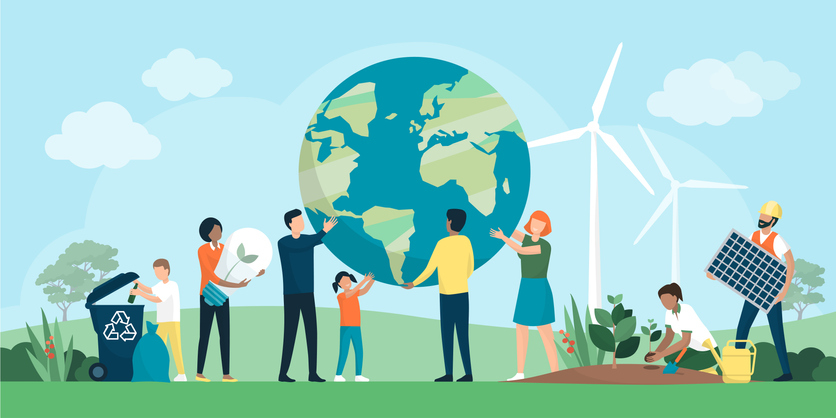Commitment + Clinical Leadership = Better Outcomes

8 Steps to Recycle and Reduce Waste
Did you know that the U.S. currently recycles less than 22% of its discarded materials? However, in 15 years, the amount of waste the world produces is expected to double, and the United States generates more waste than any other country in the world.1
Recycling is important for many reasons, including:
- Reducing waste
- Improving energy consumption
- Mitigating pollution
- Conserving resources
It’s important to recycle to help keep our planet green and minimize the number of resources that we use. Here are some steps you can use to start getting more involved in recycling!
How to Recycle More and Reduce Waste
- Set up a designated recycling container at home. One of the easiest things you can do is to set up a recycling container in your own home next to your trash can. This is the place where you can put paper, glass, soda cans, and other recyclables. Placing this next to the trash can will ensure that your family doesn’t forget to recycle these items.
- Make sure your recyclables are sent to the proper facilities. Many cities will collect recyclables on the curb, and you can place them into a plastic bag for pickup. However, if your city doesn’t offer this, you can drop your recyclables off at a designated area where they will take them to a recycling facility.
- Review your city’s recycling rules. Every city has different equipment and processes, and what can be recycled in one city might not be recyclable in another. Knowing your city’s rules can ensure that your recycling efforts are accepted. Including non-recyclables with your recyclables has the possibility of contamination, and then they will throw out the entire bag of recycled materials.
- Minimize everyday waste. Another way you can begin recycling more is by minimizing the waste you use every day. For example, you can utilize reusable shopping bags when you go to the grocery store to limit the amount of plastic bags that you use. You can also try to make items, such as office supplies, last longer by using pens until they run out and storing highlighters, markers, and sharpies in an area where they are less likely to become dry.
- Thrift. Another way you can recycle more is by utilizing thrift shops. For example, if you need to purchase a vase for flowers, checking your thrift store for one first is a great way to find something reusable, such as glass, before going to the store to buy something new.
- Donate. If you have items such as clothing, blankets, books, DVDs, utensils, appliances, collectibles, and other household goods that are in lightly used condition but you aren’t utilizing them, consider donating them. Donating items instead of throwing them away can help them find a happy home. This can prevent waste and help others enjoy the items that you would’ve thrown away.
- Reuse whenever possible. Much of the waste Americans generate are items that are reusable. For example, utilizing a reusable coffee cup can help prevent excess waste because disposable coffee cups can’t be recycled. You can also try to reuse items such as jars before going to the store to buy a new one.
- Go digital. Another way you can prevent waste is by purchasing items such as movies, music, video games, and books digitally. This will reduce the resources that are used to create hard copies of these items, which can have a positive impact on the environment.
What Can You Recycle?
Here is a list of items that you can begin recycling today according to Masterclass and Rubicon:2,3
- Paper: Cardboard boxes, newspapers, mail, magazines, printer paper, and paper tubes
- Cartons: Milk cartons, juice cartons, and soup cartons that are cleaned and rinsed
- Glass: Bottles and jars that are empty and rinsed
- Plastic: All plastics that can be recycled will have a number 1 or 2 inside of the triangle of the recycling symbol printed on it. This includes plastic bottles, jugs, and the tubs for kitchen/bathroom
- Metal containers: Tin, aluminum, and steel cans
- Food waste: Some cities have a food waste collection program where you can recycle organics
Items you can’t recycle include:
- Greasy cardboard boxes/paper
- Plastic bags
- Shrink wrap
- Broken ceramics, lightbulbs, mirrors
- Paper towels and light bulbs that are used
- Styrofoam
- Electronic waste
Saber Healthcare is an organization dedicated to providing consultant services to long term care providers. This article is for informational purposes and is not meant to be seen as professional advice. Please consult with a medical expert before relying on the information provided.
Sources
